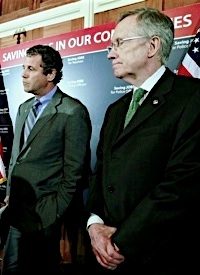
A $26 billion Senate bill, which includes $16.1 billion to help states pay for Medicaid and $10 billion for school districts, cleared a procedural hurdle on August 5 and is expected to come up for a final vote on August 6. The procedural vote passed the Senate by a vote of 61 to 38, with Maine Republicans Susan Collins and Olympia J. Snowe voting with all 59 Democrats to end debate on the measure.
The vote promoted immediate commentary from Senate Republicans, including the GOP leader Mitch McConnell of Kentucky, who said: “Washington needs to take care of its own fiscal mess, not deepen it by bailing out the states.”
Senator Judd Gregg, (R-N.H.), said the bill was political pay-back, bluntly stating, "When you go to the essence of what this bill is about, it’s to pay off education unions. Let’s not be coy."
In contrast, the bill’s primary sponsor, New York Democrat Charles Schumer, stated: “This was a bottom-of-the-ninth, come-from-behind victory to help stop layoffs in New York. At a time when we are trying to spur private-sector job creation, the last thing we could afford was layoffs of teachers and first responders.”
New York’s junior Senator, Democrat Kirsten Gillibrand, echoed Schumer’s sentiments”: “I think the right thing to do would be for members of the House to briefly return to Washington so that we can send the legislation to President Obama immediately and deliver assistance to local schools and hospitals right away.”
House Speaker Nancy Pelosi (D-Calif.) was glad to comply and announced her intention to call the House back into session next week to vote on the legislation, writing in a Twitter message: “I will be calling the House back into session early next week to save teachers’ jobs and help seniors & children.”
"The House welcomes the passage tomorrow [August 6] by the Senate of the long-delayed support for teachers, nurses and urgent services for children and seniors and people with disabilities," Pelosi was quoted by RTTNews.
The Speaker added: "As millions of children prepare to go back to school — many in just a few days — the House will act quickly to approve this legislation once the Senate votes."
A report in the Los Angeles Times cited National Education Association (NEA) estimates that 138,000 education jobs, including 13,700 in California and 5,050 in Illinois, could be saved because of the federal aid package. The NEA is the largest professional organization and largest labor union in the United States, with 3.2 million members. An article in Wikipedia notes: “The NEA is a major funder of liberal organizations and the Democratic Party, and is a frequent target of conservative ire for its perceived opposition to education reform.” That article also states:
Federal law prohibits unions from using dues money or other assets to contribute to or otherwise assist federal candidates or political parties, in accordance with their tax-exempt status. The NEA Fund for Children and Public Education is a special fund for voluntary contributions from NEA members which can legally be used to assist candidates and political parties. Critics have repeatedly questioned the NEA’s actual compliance with such laws, and a number of legal actions focusing on the union’s use of money and union personnel in partisan contexts have ensued”
A statement on the webpage of the Landmark Legal Foundation (which recently filed an Amicus Curiae [Friend of the Court] Brief in support of the State of Arizona and its illegal immigration law) under the heading “NEA Accountability Project” states: “As part of the Foundation’s NEA Accountability Project, Landmark uncovered overwhelming evidence that the National Education Association has financed and run coordinated political campaigns with the Democratic National Committee, other Democratic campaign organization, the AFL-CIO and [the pro-abortion political fundraising group] Emily’s List — without reporting the expenditures to its members or the Internal Revenue Service (IRS), as required by federal law.”
While Senator Gregg and the Landmark Legal Foundation have stated the obvious in observing the tit-for-tat relationship between the NEA’s support of Democratic members of Congress and those same politicians sending federal dollars to the states to protect teachers’ jobs, the danger goes beyond old fashioned patronage and conflict of interest.
It is a well-established principle in politics that federal aid never comes without federal controls. While government control of education at any level presents a distinct challenge to the rights of parents to be their children’s primary educators, injecting federal regulatory power into education is a perfect recipe for the creating a school system whose purpose is to train perfect citizens of the state.
To appreciate the downside of national governmental involvement in education, one need only look to Prussia, where Europe’s first national system of education was set up by King Frederick William I in 1717. In his essay “Separating School & State: How To Liberate American Families,” the libertarian political writer Sheldon Richman wrote:
After the defeat at the hands of Napoleon in 1807, King Frederick William III [of Prussia] strengthened the state’s hold on society by, among other measures, increasing the power of the school system. He instituted certification of teachers and abolished semi-religious private schools. High-school graduation examinations were necessary to enter the learned professions and the civil service. Children aged 7 to 14 had to attend school. Parents could be fined or have their children taken away if the children did not attend…. [Emphasis in original.]
When Germany emerged as a unified nation, the Prussian school system was enlarged. As Franz de Hovre wrote in 1917:
The prime fundamental of German education is that it is based on a national principle…. A fundamental feature of German education: education to the State, education for the State, education by the State. The Volksschule is a direct result of a national principle aimed at national unity. The State is the supreme end in view.
Richman observes further along in his essay: “It cannot be overemphasized that American schools, which have changed only slightly since the 19th century, were modeled on the authoritarian Prussian schools — not much of a recommendation.”
Our Constitution was adopted in 1787, 70 years after William III established his government educational system in Prussia. If our Founding Fathers, who were well-travelled men thoroughly familiar with the political systems in extent throughout Europe, had thought that the Prussian system of national control of education was a good idea, they would have listed “education” as a power granted to Congress.
The absence of any reference to education in our Constitution reflects their views on the subject clearly.
Photo: A group of senators including Majority Leader Harry Reid of Nev., right, during a news conference on Capitol Hill on Aug. 4, 2010, after a Senate vote that would clear the way for a $26 billion measure to help states save the jobs of tens of thousands of teachers and other public employees: AP Images

